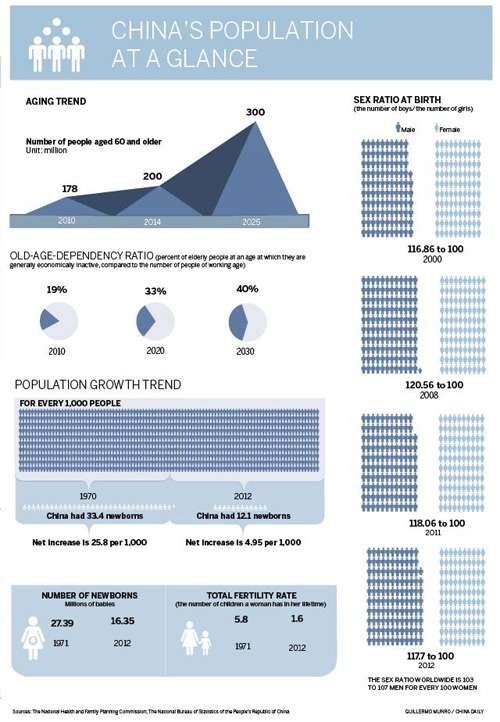Proposal approved
In the early 1980s, Liang, who was then a researcher at the Shanxi Provincial Party School, made the proposal to the central government to test his plan to contain population growth.

In September 1980, the Party Central Committee issued an open letter to all members of the Party and the Youth League, suggesting couples should only have one child to keep the population under 1.2 billion, to reduce the mounting pressure on resources and the environment.
Liang disagreed with the one-child policy, holding that the country could still effectively meet its target of keeping the population under 1.2 billion by allowing every couple to have two children while delaying the age of marriage and the age they could have children.
The central government approved Liang's proposal and Yicheng was selected because of strong support from the county's top officials.
Liang applied his test in the county's rural areas because giving birth to more than one child was more popular among rural couples before the family planning policy, and rural households are more prone to violating the policy.
Before the pilot program in Yicheng, Wang Yongliang, a family planning official in Wangzhuang township for about 30 years, said his job was "the most difficult in the world".
"People were giving birth to at least four or five children before the 1970s, and all of a sudden they are ordered to have only one," he said, adding that the policy resulted in conflict between family planning officials and couples.
"Every time you went to a village, people said, ‘Here come the gangsters'. They would curse you behind your back," he said. "If we knew a woman was pregnant but already had a child, we tried all means to convince her to give up the baby — taking all the family's precious belongings, tractors, cattle and giving them back immediately after they agreed to abort the child."
In 1985, when the county started pushing the pilot program, many family planning officials were shocked.
"Some were concerned that granting couples two children would see the situation get out of control," said Feng Caishan, then deputy head of Longhua township.

The pilot program stated women could not marry until they were 23 and men 25, and women could have the first child no younger than 24 and the second no younger than 30.
Family planning officials said allowing couples two children has made their work easier, despite there being more procedures.
To ensure the program had the desired effect, women must have contraceptive coils fitted after their first child and must be sterilized after their second.
"We had a lot more work to do, as we had to convince people to have operations after the birth of each child," Wang said. "But importantly the policy is workable because people are willing to cooperate."
In 2007, the county further loosened the birth policies and women could have their second baby no later than 28 years old.
"From the experience in Yicheng we can tell that when the policy goes against the will of people, the people will oppose it," said Feng Caishan, who became director of family planning for the county in 1990 and retired in 2002. "The policy should take the statistics into account, and people's feelings," he added.
Changing attitudes
Looking at the figures, the pilot was a success in effectively controlling population growth. Yicheng accounted for 1 percent of the population in Shanxi in 1982, but just 0.87 percent in 2010.
Meanwhile, in many neighboring counties, the family planning policy has faced a backlash. Some couples are even giving birth to three or four children, according to an official with the Yicheng Family Planning Association who spoke on condition of anonymity. The China Family Planning Association is the largest nongovernmental network active in reproductive health, family planning and HIV/AIDS prevention and care.
Despite being given the chance to have two children, more than 10,000 rural families in Yicheng have chosen to waive the right.
Liang Zhongtang, the initiator of the program, said he believes important factors lie in the changing concept of fertility since the 1980s.
|
|
|
|
|
|
|
|